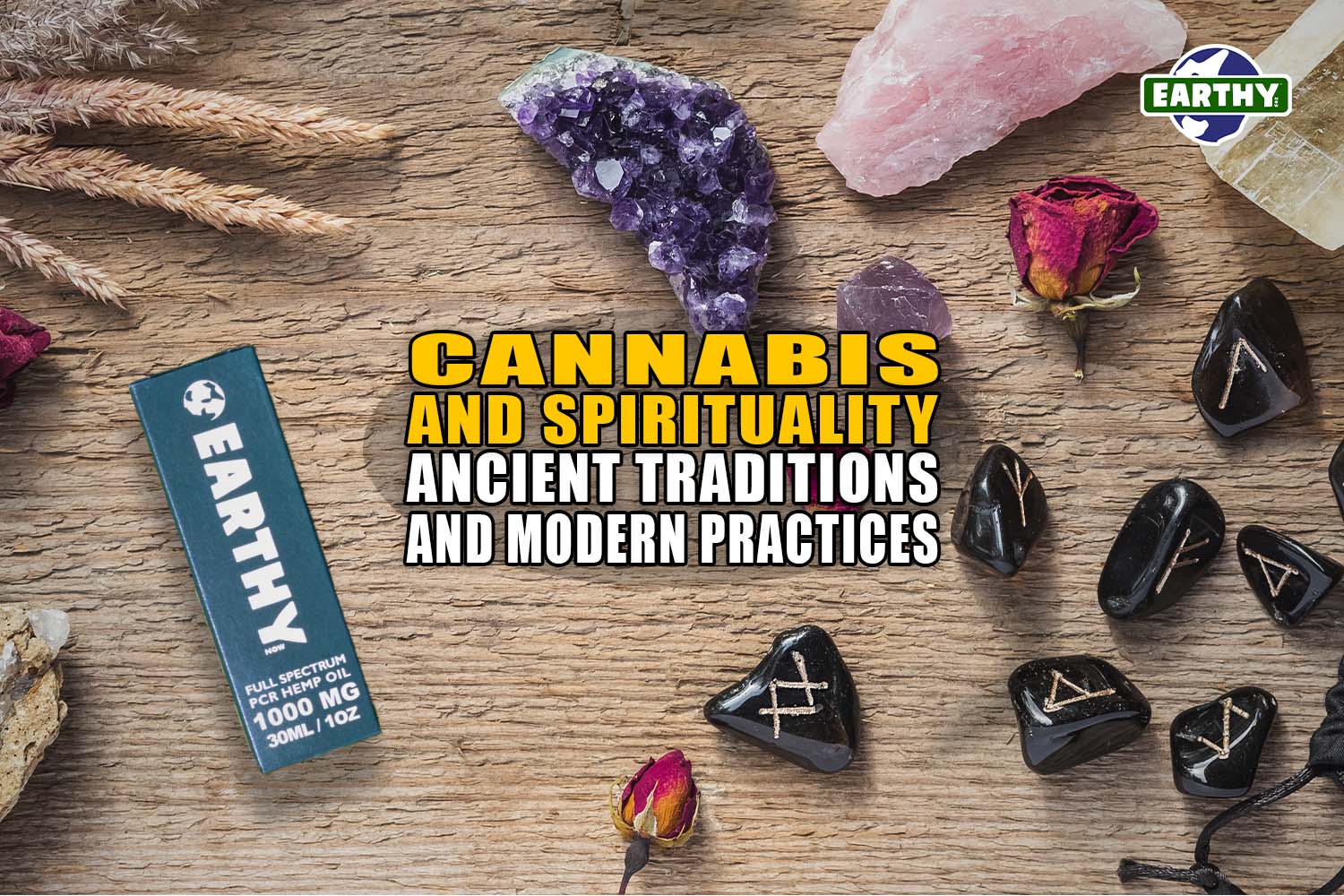Cannabis has been intertwined with humanity’s spiritual journey for millennia. Indeed, many ancient cultures revered the leafy botanical wonder as a plant spirit ally. Even now, many individuals use it as a modern catalyst for spiritual exploration [1]. For these reasons, cannabis holds a unique place in various traditions. This article digs into the historical roots and contemporary uses of cannabis in spirituality. From ancient religious rituals to modern meditation practices, cannabis continues to play a powerful role in physical and spiritual healing.
Ancient traditions
Examining cannabis’s traditional religious and ritual use
Historians trace cannabis’s spiritual uses back to ancient civilizations, where it was regarded as a sacred herb with profound spiritual benefits. Indeed, its use in religious and ritual contexts spans continents and cultures. Moreover, the evidence of its historical use reflects its revered status as one of the honored plant spirit allies in various cultures. For example, in ancient India, cannabis was integrated into Hindu rituals, particularly in the worship of the goddess Shiva. In this context, participants consumed cannabis as bhang ( drink) during religious festivals. Notably, believers saw these rituals as facilitating spiritual awakening and connection to the divine [1].
In ancient China, cannabis was valued in Taoist practices for its ability to enhance meditation and connect practitioners with spiritual realms. To many, it was considered a sacred medicine plant that facilitated a deeper understanding of the universe. Similarly, in ancient Egypt, cannabis played a role in funerary rites, helping souls transition to the afterlife. The plant’s spirit was viewed as a conduit for spiritual energy, aiding in the realignment and rebalancing of the physical and spiritual bodies [1].
7 Reasons People Enjoy Cannabis Before Sex
Exploring cannabis spirituality: ancient religious texts and traditions
Cannabis’s role in spiritual practice is documented in various religious texts. For example, discovered texts reveal that ancient Egyptians used cannabis in rituals to ensure the safe passage of the deceased into the afterlife. Also, Siberian shamans believed that cannabis drives the unconscious material of the soul to the surface, where spiritual and physical energy transforms. Evidence of these practices and beliefs highlights the cannabis plant’s purported ability to transform physical energy and connect individuals with deeper spiritual truths [2].
How to Choose the Right Wholesale CBD Flower Supplier
Modern practices: cannabis and spirituality
Contemporary spiritual movements
Spiritual practices of the modern cannabis movement explore similar themes to those of ancient traditions. For example, the Rastafarian movement views ganja (cannabis) as a sacrament, a gift from Jah to aid in spiritual awakening and communion [3]. Like in ancient India, Egypt, China, and Siberia, this modern movement explores the spiritual benefits of cannabis. Additionally, other forms of cannabis spirituality have emerged where advocates integrate its use into Neo-pagan and New Age rituals. Ultimately, these movements recognize cannabis as a powerful ally in the spiritual awakening process, offering a path to connect with higher consciousness and the sacred world [4].
Cannabis and meditation
Cannabis’s ability to promote heightened mindfulness for some individuals has made it a popular aid in meditation practices. For example, many practitioners report that cannabis enhances their awareness meditation, helping to deepen their focus. They claim this spiritual exploration leads to a more profound understanding of one’s own reality and the spiritual subjects they ponder. Likewise, some people report that the use of cannabis in meditation aligns with basic spiritual working principles, allowing them to access deeper states of consciousness [5].
The Role of Cannabis in Modern Medicine
Cannabis and psychedelic spirituality
The use of cannabis in psychedelic healing contexts has gained traction alongside other entheogens like ayahuasca. Ayahuasca is a South American psychoactive beverage used by indigenous cultures in the Amazon for spiritual ceremonies [6]. Notably, books such as the “Ayahuasca Test Pilots Handbook” and Santo Daime’s teachings emphasize plant medicines’ spiritual benefits. Proponents of these approaches claim that cannabis’s entheogenic properties make it a valuable tool in spiritual awakening processes, comparable to other sacred medicine plants. Hence, some therapists have promoted the integration of cannabis in psychedelic therapy sessions, claiming that it may facilitate a personal spiritual experience and profound healing [7].
Legal and ethical considerations
Legal status of cannabis
The legal status of cannabis varies widely, impacting its use in wellness, recreation, and spiritual practices. While some regions have embraced the plant’s medical benefits and legalized its use, others still classify it among currently illegal drugs [8]. As a result, this disparity affects people’s ability to conduct group ceremonies and integrate cannabis into their spiritual practices. However, as societies evolve their understanding of cannabis’s potential benefits, the legal landscape may continue to change, allowing for more widespread acceptance of cannabis in spiritual contexts.
Why Is the Emerald Triangle So Good for Growing Cannabis
Ethical concerns
The ethical considerations surrounding cannabis use in spirituality include ensuring responsible consumption and respecting traditional wisdom and traditions. For example, some people raise concerns for potential abuse and cultural appropriation, making it essential for practitioners to honor the sacred world associated with cannabis traditions with respect and mindfulness. Also, some cannabis spiritualists stress the importance of approaching cannabis as a “spirit medicine,” recognizing its power as an ancient plant spirit ally [9].
Personal stories and experiences
Interviews with modern practitioners
Interviews with spiritual healers and cannabis shamans, such as Hamilton Souther, reveal how profoundly plants impact some people’s personal spiritual experiences [10]. For instance, some plant advocates highlight what they see as one of cannabis’s greatest gifts: its ability to integrate physical and spiritual healing. Likewise, Souther emphasizes its power to promote the “awakened heart wisdom” that guides many on their spiritual journeys. These personal stories underscore the plant’s role in contemporary spiritual practices [11].
Case studies
Notably, certain case studies illustrate the transformative power of cannabis in some extreme life circumstances, demonstrating its role in spiritual experiences. For example, these stories often involve the plant’s ability to facilitate a realignment and rebalancing process, sometimes leading to significant spiritual benefit and personal growth. Also, individuals facing terminal illness or undergoing major life transitions sometimes find solace and healing through the spiritual use of cannabis [12].
Cannabis Tourism: Best Destinations and Tips for Travelers
Premium cannabis flower and products from Earthy Now
For cannabis enthusiasts seeking reliable, trustworthy sources of cannabis flower and other hemp-derived products, Earthy Now has something for everyone. These products are the industry’s cleanest and strongest, with only trace amounts of Delta-9 THC.
Explore these natural, organic products from Earthy Now:
- CBD Flower
- Gummies
- Lozenges
- Tablets (THC Free!)
- Soothing Relief Lotion
- Soothing Relief Salve
- CBD Pet Tinctures (no THC!)
- Oils
- Pre-Rolls
- Smokes
- Terpenes
Key takeaway: cannabis and spirituality
Cannabis has played a pivotal role in humanity’s co-evolution, serving as both an ancient and modern spiritual ally. From its historical use in sacred shamanic wisdom practices to its place in the modern cannabis movement, this amazing plant ally continues to offer diverse spiritual benefits to many [1]. Hence, as societies evolve their understanding of cannabis’s healing benefits and spiritual potential, it remains a key starting point for some exploring their spiritual future. Ultimately, the integration of cannabis into spiritual practices reflects humanity’s eternal quest for connection with the divine and the sacred.
Visit Earthy Now and discover rare, organic cannabis products that may serve you in physically and spiritually beneficial ways!
Medical Disclaimer / Legal Disclaimer – Information is provided for educational purposes. It does not and is not intended to constitute legal advice or medical advice. We attempt to be accurate and up-to-date, but the legality of cannabinoids and the science of cannabis are evolving. The author is neither a legal professional nor a medical expert. Before buying or using any products, you should check with your local authorities and medical providers.
References
- The Sacred Uses of Cannabis by Ancient Cultures
- Experts Find That Ancient Egyptians Used Cannabis For Numerous Reasons
- Cannabis in Rastafarian Culture
- Cannabis in Religion Practices
- Cannabis and Meditation: How Marijuana Can Enhance Spiritual Awakening
- Cannabis as Entheogen: Survey and Interview Data on the Spiritual Use of Cannabis
- How Cannabis Is Used in Psychedelic-Assisted Therapy
- Cannabis Legality by State
- Be Cognizant of Cannabis Cultural Appropriation
- Hamilton Souther: How to be Prepared for the Rapid Changes About to Come
- A Thematic Examination of the Spiritual Usage of Cannabis: A Qualitative Exploratory Approach





